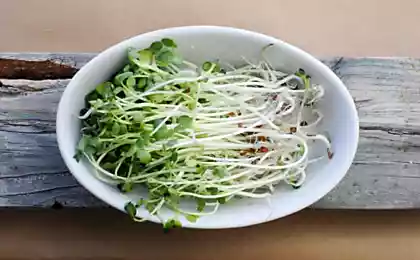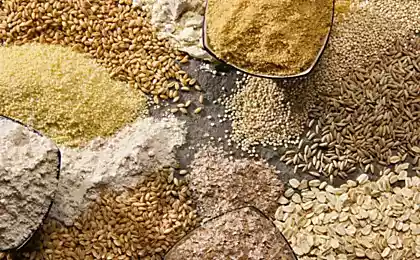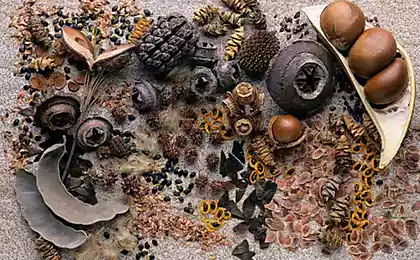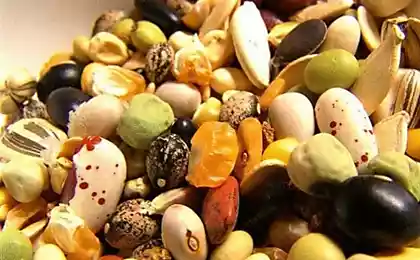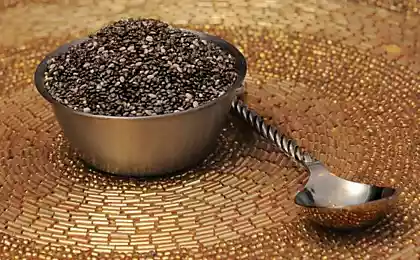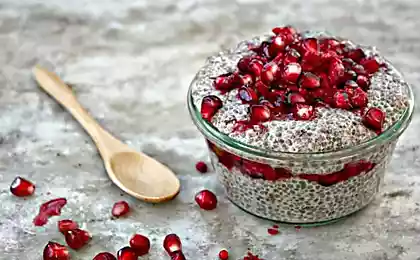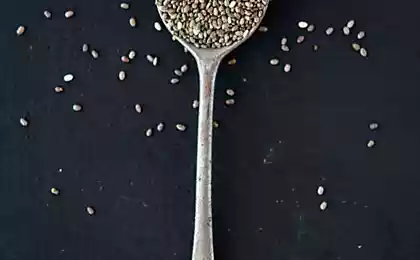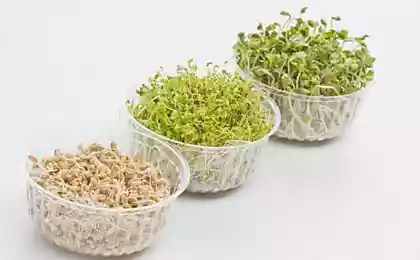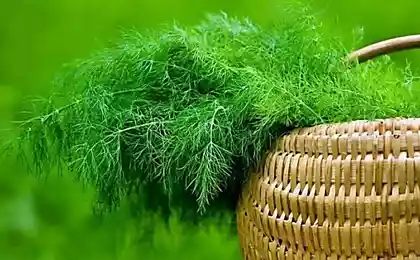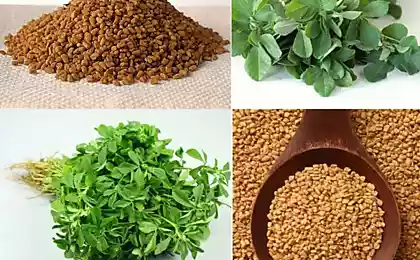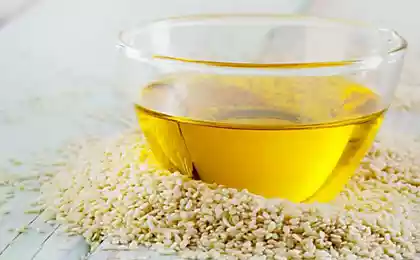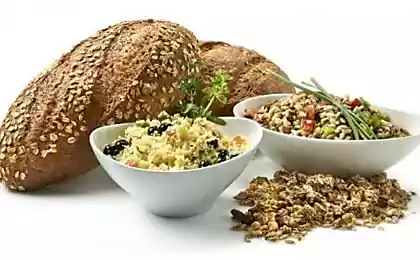397
9 of the most useful seeds and grains for health
Seeds are very healthy and nutritious. Basically, we are attracted to seeds and larger grains, such as nuts or legumes. Of the small ones, of course, the most popular are sunflower seeds. But what do we know about the others? And how best to use them to get the most useful substances for our body.
How best to use seeds and grains The best way to get the most out of seeds is to eat them raw. Heat treatment leads to the formation of toxins, and vitamins, minerals and essential oils are denatured. Fried seeds are no longer living food. No seeds in the world can withstand heating and frying, retaining their nutritional properties. It is always worth remembering that you need to eat seeds in their natural state - cheese. They can be soaked, ground and crushed, especially if the seed shell is too hard for the teeth.
1. Hemp seeds An increasing number of people are discovering the nutritional properties of seeds and hemp oil. Hemp contains:
All twenty amino acids, including the nine essential ones that the human body does not produce.
A large number of simple proteins that increase immunity and resistance to toxins. Eating cannabis seeds helps (if not cures) people suffering from immunodeficiency-related diseases. The conclusion is supported by the fact that they were used to treat nutrient deficiencies caused by tuberculosis.
the highest concentration of essential fatty acids in the plant world, exceeding that of any nuts or seeds, including flax seeds
The ideal ratio of omega-6 and omega-3 linolenic acid – invaluable for the health of the cardiovascular and immune systems of the human body
Hemp seeds One of the best sources of easily digestible vegetable protein. They also have many phytonutrients that support the normal state of tissues, blood vessels, skin cells, organs and mitochondria. And finally, it is the richest source of polyunsaturated basic fatty acids.
The best way to provide the body with enough amino acid material to produce globulin is to eat food rich in globulin proteins. Since 65% of the protein in cannabis seeds is globulin, and there is also a certain amount of albumin, this protein is ideal for humans, since it is the same in shape as the protein in the blood plasma. Thus, the use of cannabis seeds provides the body with all the necessary amino acids to maintain health, increase immunity and protect against many dangerous diseases associated with immunodeficiency.
2. Pomegranate grain Pomegranate grains are an excellent source of antioxidants, so they help protect our body from the harmful effects of free radicals that cause premature aging.
Simply put, the juice from pomegranate grains increases the level of oxygen in the human blood. Antioxidants counteract free radicals and prevent blood clots in blood vessels. This allows you to maintain free blood circulation and ensure normal oxygen access to tissue cells.
Pomegranates are unusually rich in polyphenols (a special form of antioxidants), which reduce the risk of cancer and heart failure. In fact, pomegranate juice containing tannins, anthocyanins and ellagic acid has even higher antioxidant activity than green tea and red wine.
Pomegranates, thanks to edible seeds enclosed in juicy “bags”, have large reserves of vitamin C and potassium (it should be noted their low calorie content), and also represent a good source of dietary fiber.
The antioxidant properties of pomegranates prevent the oxidation of low-sensitivity lipoprotein cholesterol. This essentially means protection against thickening of the walls of blood vessels due to excess fat, which leads to impaired blood circulation and the appearance of blood clots.
“In experimental mice treated with pomegranate juice, significantly (not less than 30 percent) slowed the development of atherosclerosis,” says Claudio Napoli, professor of medicine and clinical pathology at the University of Naples.
The useful properties of the pomegranate are not exhausted by the above. It helps to restore arthritis-affected cartilage, has the ability to facilitate inflammatory processes and counteract enzymes that destroy cartilage tissue.
3. Flax seeds Dietary fiber, which is part of flax seeds, reduces sharp fluctuations in the level of lipids in the blood after eating and thus regulates our appetite. Scientists from the University of Copenhagen have obtained experimental data on the ability of flax seeds to suppress appetite and contribute to weight loss.
Flax has been cultivated for centuries and is known for its unsurpassed qualities worldwide. Hippocrates wrote about the use of flax to relieve abdominal pain, and the French Emperor Charlemagne loved this plant so much that he even issued a law that obliged it to be used.
The main useful properties of flax seeds are the high content of alpha-linolenic acid, dietary fiber and lingans. One of the main fatty acids, alpha-linolenic acid prevents the formation of substances that provoke inflammation, and also reduces the level of reactive C-protein in the blood. Due to the action of alpha-linolenic acid and lingans, flax blocks the development of tumors in animals and may help reduce the risk of cancer changes in humans.
Lingans These are plant estrogens, elements of plant tissue that have an estrogenic effect and antioxidant properties. They help stabilize hormonal balance, relieve symptoms of PMS and menopause, and potentially reduce the risk of breast and prostate cancer.
The fiber of flax seeds promotes healthy digestion. One tablespoon of whole seeds contains as much fiber as half a glass of oat bran. Flax soluble fiber may reduce the risk of heart attack.
In crushed form, flax seeds are even more useful than whole. They can be ground in a coffee grinder or blender and then added to cereals, baked goods or cocktails. And regular consumption of flaxseed oil or flaxseed broth perfectly helps with gastric diseases.
4. Pumpkin seeds They are the only seeds that contribute to the creation of an alkaline environment. Pumpkin seeds are characterized by a high protein content. 100 grams of these seeds, when taken daily, provide 54 percent of a person’s protein needs.
Most of us take pills to make up for a deficiency of B vitamins, while pumpkin seeds are much more effective in this regard. They are rich in thiamine, riboflavin, nicotinamide, pantothenic acid, vitamin B-6 and folate.
For those who tend to lose heart, pumpkin seeds are especially useful, as they help to resist depression thanks to L-tryptophan, a chemical compound that increases our mood.
They are also able to prevent the formation of certain types of kidney stones, preventing the accumulation of calcium oxalate.
And finally, pumpkin seeds are an excellent remedy against parasites, especially helminths.
5. Apricot seeds Apricot seed kernels, like most nuts and seeds, are very nutritious. Among the nutrients contained in them is amygdalin, also known as vitamin B-17. It kills cancer cells and thus prevents the development of cancer.
Foods rich in amygdalin, a great many, but most of them have almost disappeared from the daily diet of residents of civilized countries. People around the world who still adhere to traditional cuisine are much less likely to get cancer, as national dishes include products containing amygdalin.
In addition to apricot seeds, amygdalin is rich in bitter almonds (amygdalin has a bitter taste, so that sweet almonds do not contain this substance, as well as sweet apricot seeds). Amigdalin is also present in seeds of apples, grapes, millet, green beans, most berries, cassava and many other seeds and grains, with the exception of hybrids.
In order to prevent cancer, biochemist Ernst T. Krebs, who first isolated amygdalin in concentrated form in the 50s of the last century, recommended the use of amygdalin. A person who eats ten to twelve apricot kernels a day for a lifetime is likely to be protected from cancer.
6. Sesame seeds Sesame seeds are probably the oldest seasoning known to man. They were valued especially highly due to their exceptional ability to retain freshness and resistance against the appearance of rancid taste.
They are an excellent source of magnesium and copper, as well as calcium, iron, phosphorus, vitamin B1, zinc and dietary fiber. In addition to these essential nutrients, sesame seeds contain two unique ingredients: sesamin and sesamoline. Both of these compounds belong to a group of nutrient fibers called lingans. They have the ability to reduce the level of cholesterol in human blood, prevent increased pressure and increase the supply of vitamin E in animals. Sesamin is also known to protect the liver from oxidative damage.
7. Sunflower seeds Sunflower seeds are an exceptional source of vitamin E, the main fat-soluble antioxidant in the human body. Vitamin E travels throughout the body, neutralizing the action of free radicals that can damage fat-containing structures and molecules, such as cell membranes, brain tissue and cholesterol.
Sunflower seeds are high in phytosterols. These are chemical compounds of plant origin, similar in structure to cholesterol. With their regular use in sufficient quantities, you can achieve a decrease in cholesterol levels, improve the immune response and reduce the risk of certain cancers.
As already mentioned, sunflower seeds are characterized by an extremely high concentration of magnesium. Numerous studies confirm the ability of magnesium to positively affect the manifestations of asthma symptoms, reduce blood pressure and prevent migraine headaches, as well as reduce the risk of heart attack.
8. Cumin seeds The beneficial properties of cumin seeds have been known to mankind since antiquity. This traditional seasoning has been famous for its medicinal properties for centuries.
Kumin (or min) is useful for digestive disorders, and is also a good antiseptic. Seeds are rich in iron and help maintain normal liver function.
In addition, cumin helps get rid of the symptoms of a common cold. With sore throats, you can make a decoction of them, add a little dried ginger and take this drink to eliminate discomfort.
Cumin juice can serve as an excellent tonic for the whole body in the absence of any specific diseases. It is believed that it is able to accelerate the general metabolic processes in the body, making metabolism more efficient.
Kumin is a powerful tool for activating the functions of the liver and kidneys, allowing you to strengthen the immune system. With the help of black cumin seeds, asthma and arthritis have long been treated.
9. Grape seeds Grape seeds have a high content of vitamin E, flavanoids, linoleic acid and polyphenols. Grape seed extract can prevent heart disease, sharp fluctuations in blood pressure and an increase in cholesterol. By limiting the processes of lipid oxidation, the phenolic resins contained in them increase platelet aggregation and contribute to the cessation of inflammatory processes.
According to data published in the journal Carcinogenesis, grape seed extract kills squamous cancer cells, leaving healthy cells intact. And more recently, the journal Applied and Environmental Microbiology published data on the effectiveness of its use to reduce the infective capacity of the newly discovered “stomach flu” virus and its modifications. published
What seeds do you consume in your diet?
P.S. And remember, just by changing our consumption – together we change the world!
Join us on Facebook and VKontakte, and we are in Odnoklasniki
How best to use seeds and grains The best way to get the most out of seeds is to eat them raw. Heat treatment leads to the formation of toxins, and vitamins, minerals and essential oils are denatured. Fried seeds are no longer living food. No seeds in the world can withstand heating and frying, retaining their nutritional properties. It is always worth remembering that you need to eat seeds in their natural state - cheese. They can be soaked, ground and crushed, especially if the seed shell is too hard for the teeth.
- Choose raw and unsalted seeds.
- Avoid fried and glazed seeds.
- Less sweeteners.
1. Hemp seeds An increasing number of people are discovering the nutritional properties of seeds and hemp oil. Hemp contains:
All twenty amino acids, including the nine essential ones that the human body does not produce.
A large number of simple proteins that increase immunity and resistance to toxins. Eating cannabis seeds helps (if not cures) people suffering from immunodeficiency-related diseases. The conclusion is supported by the fact that they were used to treat nutrient deficiencies caused by tuberculosis.
the highest concentration of essential fatty acids in the plant world, exceeding that of any nuts or seeds, including flax seeds
The ideal ratio of omega-6 and omega-3 linolenic acid – invaluable for the health of the cardiovascular and immune systems of the human body
Hemp seeds One of the best sources of easily digestible vegetable protein. They also have many phytonutrients that support the normal state of tissues, blood vessels, skin cells, organs and mitochondria. And finally, it is the richest source of polyunsaturated basic fatty acids.
The best way to provide the body with enough amino acid material to produce globulin is to eat food rich in globulin proteins. Since 65% of the protein in cannabis seeds is globulin, and there is also a certain amount of albumin, this protein is ideal for humans, since it is the same in shape as the protein in the blood plasma. Thus, the use of cannabis seeds provides the body with all the necessary amino acids to maintain health, increase immunity and protect against many dangerous diseases associated with immunodeficiency.
2. Pomegranate grain Pomegranate grains are an excellent source of antioxidants, so they help protect our body from the harmful effects of free radicals that cause premature aging.
Simply put, the juice from pomegranate grains increases the level of oxygen in the human blood. Antioxidants counteract free radicals and prevent blood clots in blood vessels. This allows you to maintain free blood circulation and ensure normal oxygen access to tissue cells.
Pomegranates are unusually rich in polyphenols (a special form of antioxidants), which reduce the risk of cancer and heart failure. In fact, pomegranate juice containing tannins, anthocyanins and ellagic acid has even higher antioxidant activity than green tea and red wine.
Pomegranates, thanks to edible seeds enclosed in juicy “bags”, have large reserves of vitamin C and potassium (it should be noted their low calorie content), and also represent a good source of dietary fiber.
The antioxidant properties of pomegranates prevent the oxidation of low-sensitivity lipoprotein cholesterol. This essentially means protection against thickening of the walls of blood vessels due to excess fat, which leads to impaired blood circulation and the appearance of blood clots.
“In experimental mice treated with pomegranate juice, significantly (not less than 30 percent) slowed the development of atherosclerosis,” says Claudio Napoli, professor of medicine and clinical pathology at the University of Naples.
The useful properties of the pomegranate are not exhausted by the above. It helps to restore arthritis-affected cartilage, has the ability to facilitate inflammatory processes and counteract enzymes that destroy cartilage tissue.
3. Flax seeds Dietary fiber, which is part of flax seeds, reduces sharp fluctuations in the level of lipids in the blood after eating and thus regulates our appetite. Scientists from the University of Copenhagen have obtained experimental data on the ability of flax seeds to suppress appetite and contribute to weight loss.
Flax has been cultivated for centuries and is known for its unsurpassed qualities worldwide. Hippocrates wrote about the use of flax to relieve abdominal pain, and the French Emperor Charlemagne loved this plant so much that he even issued a law that obliged it to be used.
The main useful properties of flax seeds are the high content of alpha-linolenic acid, dietary fiber and lingans. One of the main fatty acids, alpha-linolenic acid prevents the formation of substances that provoke inflammation, and also reduces the level of reactive C-protein in the blood. Due to the action of alpha-linolenic acid and lingans, flax blocks the development of tumors in animals and may help reduce the risk of cancer changes in humans.
Lingans These are plant estrogens, elements of plant tissue that have an estrogenic effect and antioxidant properties. They help stabilize hormonal balance, relieve symptoms of PMS and menopause, and potentially reduce the risk of breast and prostate cancer.
The fiber of flax seeds promotes healthy digestion. One tablespoon of whole seeds contains as much fiber as half a glass of oat bran. Flax soluble fiber may reduce the risk of heart attack.
In crushed form, flax seeds are even more useful than whole. They can be ground in a coffee grinder or blender and then added to cereals, baked goods or cocktails. And regular consumption of flaxseed oil or flaxseed broth perfectly helps with gastric diseases.
4. Pumpkin seeds They are the only seeds that contribute to the creation of an alkaline environment. Pumpkin seeds are characterized by a high protein content. 100 grams of these seeds, when taken daily, provide 54 percent of a person’s protein needs.
Most of us take pills to make up for a deficiency of B vitamins, while pumpkin seeds are much more effective in this regard. They are rich in thiamine, riboflavin, nicotinamide, pantothenic acid, vitamin B-6 and folate.
For those who tend to lose heart, pumpkin seeds are especially useful, as they help to resist depression thanks to L-tryptophan, a chemical compound that increases our mood.
They are also able to prevent the formation of certain types of kidney stones, preventing the accumulation of calcium oxalate.
And finally, pumpkin seeds are an excellent remedy against parasites, especially helminths.
5. Apricot seeds Apricot seed kernels, like most nuts and seeds, are very nutritious. Among the nutrients contained in them is amygdalin, also known as vitamin B-17. It kills cancer cells and thus prevents the development of cancer.
Foods rich in amygdalin, a great many, but most of them have almost disappeared from the daily diet of residents of civilized countries. People around the world who still adhere to traditional cuisine are much less likely to get cancer, as national dishes include products containing amygdalin.
In addition to apricot seeds, amygdalin is rich in bitter almonds (amygdalin has a bitter taste, so that sweet almonds do not contain this substance, as well as sweet apricot seeds). Amigdalin is also present in seeds of apples, grapes, millet, green beans, most berries, cassava and many other seeds and grains, with the exception of hybrids.
In order to prevent cancer, biochemist Ernst T. Krebs, who first isolated amygdalin in concentrated form in the 50s of the last century, recommended the use of amygdalin. A person who eats ten to twelve apricot kernels a day for a lifetime is likely to be protected from cancer.
6. Sesame seeds Sesame seeds are probably the oldest seasoning known to man. They were valued especially highly due to their exceptional ability to retain freshness and resistance against the appearance of rancid taste.
They are an excellent source of magnesium and copper, as well as calcium, iron, phosphorus, vitamin B1, zinc and dietary fiber. In addition to these essential nutrients, sesame seeds contain two unique ingredients: sesamin and sesamoline. Both of these compounds belong to a group of nutrient fibers called lingans. They have the ability to reduce the level of cholesterol in human blood, prevent increased pressure and increase the supply of vitamin E in animals. Sesamin is also known to protect the liver from oxidative damage.
7. Sunflower seeds Sunflower seeds are an exceptional source of vitamin E, the main fat-soluble antioxidant in the human body. Vitamin E travels throughout the body, neutralizing the action of free radicals that can damage fat-containing structures and molecules, such as cell membranes, brain tissue and cholesterol.
Sunflower seeds are high in phytosterols. These are chemical compounds of plant origin, similar in structure to cholesterol. With their regular use in sufficient quantities, you can achieve a decrease in cholesterol levels, improve the immune response and reduce the risk of certain cancers.
As already mentioned, sunflower seeds are characterized by an extremely high concentration of magnesium. Numerous studies confirm the ability of magnesium to positively affect the manifestations of asthma symptoms, reduce blood pressure and prevent migraine headaches, as well as reduce the risk of heart attack.
8. Cumin seeds The beneficial properties of cumin seeds have been known to mankind since antiquity. This traditional seasoning has been famous for its medicinal properties for centuries.
Kumin (or min) is useful for digestive disorders, and is also a good antiseptic. Seeds are rich in iron and help maintain normal liver function.
In addition, cumin helps get rid of the symptoms of a common cold. With sore throats, you can make a decoction of them, add a little dried ginger and take this drink to eliminate discomfort.
Cumin juice can serve as an excellent tonic for the whole body in the absence of any specific diseases. It is believed that it is able to accelerate the general metabolic processes in the body, making metabolism more efficient.
Kumin is a powerful tool for activating the functions of the liver and kidneys, allowing you to strengthen the immune system. With the help of black cumin seeds, asthma and arthritis have long been treated.
9. Grape seeds Grape seeds have a high content of vitamin E, flavanoids, linoleic acid and polyphenols. Grape seed extract can prevent heart disease, sharp fluctuations in blood pressure and an increase in cholesterol. By limiting the processes of lipid oxidation, the phenolic resins contained in them increase platelet aggregation and contribute to the cessation of inflammatory processes.
According to data published in the journal Carcinogenesis, grape seed extract kills squamous cancer cells, leaving healthy cells intact. And more recently, the journal Applied and Environmental Microbiology published data on the effectiveness of its use to reduce the infective capacity of the newly discovered “stomach flu” virus and its modifications. published
What seeds do you consume in your diet?
P.S. And remember, just by changing our consumption – together we change the world!
Join us on Facebook and VKontakte, and we are in Odnoklasniki

